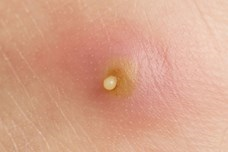Skin Infections
First aid for common skin infections
It is very useful to have a first aid kit at home so that you can treat common wounds and infections. Common types of skin infections include:
- Cuts, scratches and grazes
- Cuts, scratches and grazes are best treated with good skin hygiene measures, such as cleaning the area with warm water and covering it with a plaster or bandage.

Covering the wound prevents bugs from getting into it (causing an infection). Most cuts, scratches and grazes will heal by themselves after a few days.
See your doctor if you notice any of the following it could be infected:
- There is pus.
- The area around the cut, scratch or graze is red, painful to touch and swollen, or red lines on the skin spread out from the injured area.
- You experience persisting or significant loss of sensation near the wound or you're having trouble moving any body parts.
- You have a fever and feel unwell.
Impetigo
Impetigo (also called school sores) is a very contagious skin infection. This means it easily spreads from one person to another. Impetigo is found generally on your hands and face, especially around your nose and mouth.

Children should see a doctor for assessment and treatment. Careful cleaning of the sores and the use of antiseptic or antibiotic cream may be advised.
Sometimes oral antibiotics are prescribed. Children should be kept away from school or day care until the sores are healed, or as advised by your doctor.
Boils and abscesses
Boils and abscesses are tender, red spots, lumps or pustules that form at the bottom of a hair follicle. They are caused by a build up of pus under the skin.

If you have a cut, scratch or any break in the skin barrier, this leaves the skin at risk of infection and can lead to the development of a boil.
Boils can form abscesses and/or cellulitis. Most boils and abscesses can be treated with incision and drainage (a procedure where the pus is released from under the skin). See your doctor if you think you have a boil or abscess.
Infected eczema
Eczema (also called atopic dermatitis) is a condition where patches of skin become dry, inflamed, itchy, red, cracked and rough. It is commonly found behind your knees and on your arms, hands, neck and face.
Eczema is not contagious, which means you cannot give eczema to someone else and you cannot get eczema from someone else.
Sometimes when the skin is red, weepy and blistered, it may become infected. Antibiotics may be needed if your skin becomes infected.
Crystaderm® First Aid Antiseptic Cream
Crystaderm provides strong protection against skin infection without a prescription.
- No risk of topical antibiotic resistance
- Won’t stain skin, hands and fabric
- Dries fast
- Vanishes as you apply
- An essential item for your family’s first aid kit
https://www.healthnavigator.org.nz/health-a-z/s/skin-infections/
Our Opening Hours
Mon 8.30am - 5:00pm
Tue 8.30am - 5:00pm
Wed 8.30am - 6:00pm
Thur 8.30am - 5:00pm
Fri 8.30am - 5:00pm
Sat 9.00am - 7:00pm
Sun Closed (Church Street Dispensary is open for all your prescription and pharmacy needs on Sundays when we are closed)
*Open 10 am to 12 noon on Public Holidays
Contact us
Phone:
07 315 6251
Fax:
07 315 6250
General Enquiries:
opotikipharmacy@xtra.co.nz
Prescriptions:
opotikipharmdispen@xtra.co.nz
110 Church Street
Ōpōtiki 3122
New Zealand